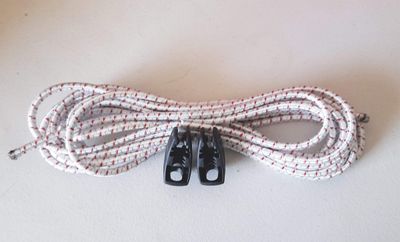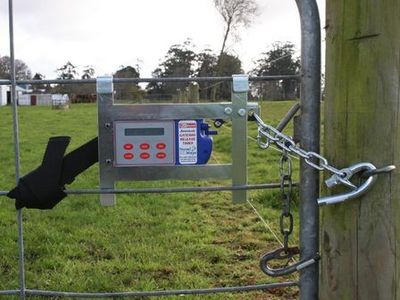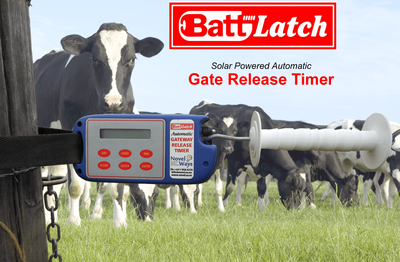
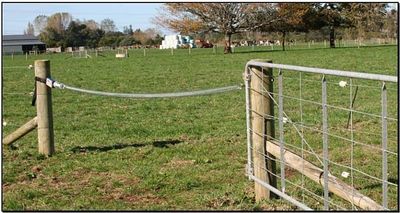
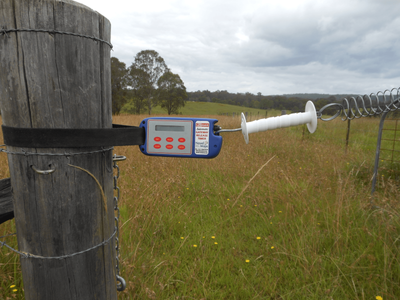
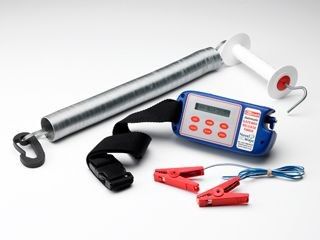
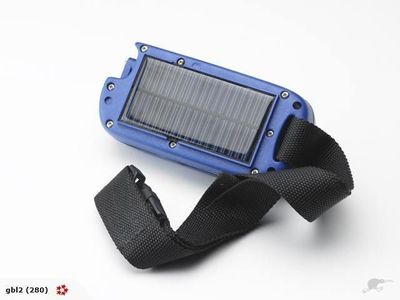
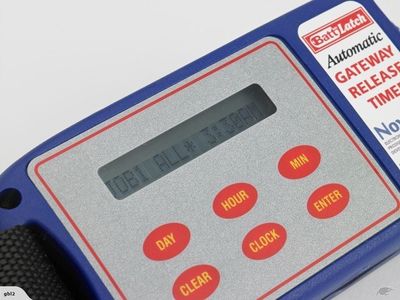
Batt-Latch Gate Release Timer
$556.50
The Batt-latch is the world’s only portable solar-powered automatic gate opener timer..
Pre-programmed by the farmer, this timer can be used on any gate system, and is particularly suited to dairy farmers with feed pads or supplementary feeding.
In a paddock situation, the timer and a temporary gate replace the function of the normal gate.
Attach the Batt-Latch to one post with its adjustable webbing strap and then hook the supplied spring gate or bungy cord to the latch cam, stretch it across and clip it to the other post, or wire fence.
When the preset time is reached, the battery-powered internal motor/gearbox is activated by the timer, the cam turns 360° and the spring gate is released, enabling the stock to make their own way to the dairy, feed pad or other destination.
=================================================
Youtube demonstration of the BattLatch
=================================================
Batt-Latch Features
- Completely portable. No extra batteries, wires, bolts or assemblies required.
- Solar powered. Internal NiCad battery is continually recharged by solar panel on back of the unit making the Batt-Latch virtually maintenance free.
- Lightweight and small. Weighing less than 2kg, the Batt-Latch is easy to handle and carry and can easily fit in an overall pocket.
- Rugged and Waterproof: Made from UV stabilised polycarbonate composite; waterproofed with neoprene sealing gasket and O-rings and, underwater tested, the Batt-Latch is made to withstand the harsh conditions that a farming environment provides.
- Electronic control. Simple yet effective electronics allow the flexibility of multiple activations (releases) for any or all days of the week without having to continually reprogram each event.
- Excellent support and backup. Grazetech provide service and support for the Batt-Latch that is second to none including servicing and carrying of spare parts. 2 year standard warranty.
Batt-Latch uses
Release herd for milking – The cows are closed into their paddock with the Batt-Latch, which is programmed to release a spring gate at the morning or evening milking time. As the spring gate is released against a post it will alert the cows that the gateway has been opened. They will then walk up to the dairy on their own, especially with the added incentive of a feedpad or supplements, as is common practice. Depending on the farm's shape and the distance to the rear of the farm, up to 45 minutes per milking can be saved.
Hold the herd back after milking – Another Batt-Latch can be used to set up a spring gate at the back of the dairy or nearby race to hold the cows back after they have been milked. At the end of the milking session the farmer can get ahead of the cows to set up gates or feed out supplements, normally using another Batt-Latch to close the cows in with. This will also mean that the cows will be entering the paddock together, so heifers will get less stressed. Out timer is also ideal for ensuring that break-fed maize and other crops are equally available to the whole herd (allow the first cows in from milking just some of the crop, release more when all cows are milked).
Break feeding or Run-offs - One or more Batt-Latches can be set up with spring gates to let stock into an adjacent break-feeding area, or open another paddock off a common race. At the set time the Batt-Latch will release the gateway and the cows or stock will go into the next area for grazing. This can be done for a maximum of fourteen days with multiple units, which will allow the farmer to be away from the farm for longer periods. Visits to the run-off can be made less frequently by using the Batt-Latch. The Batt-Latch(es) can be set up so that they are releasing 2 or 3 days apart and letting stock into a fresh new grazing area. This method can run-off visits to only once in 10 days.
Once-a-day summer milking: By milking in the morning and utilising a Batt-Latch to free the herd to new pasture in the afternoon, there is no need for workers to come back onto the farm just for that job, saving labour and freeing up leisure time.
Controlling access to or from feed pads Using a Batt-Latch to control access to a feed pad or release of the herd from a feed pad not only saves time by not having to be there, it can ensure all animals have equal opportunity to feed, or when released, equal opportunity to feed from the paddock they are released into.
Split herds: If you have split herds using a feedpad and/or dairy, you will find uses for more than one Batt-Latch. You could number or name these so that the release times follow the same herd, to make it easier for staff. Make sureyou have good “lead” cows in each herd.
Horses The Batt-Latch has been very successfully used with horses for releasing or allowing them access to pasture or hard feed allowing the owner to control the weight gain and condition of the animal. Horse owners also find the Batt-Latch useful as often they are 'absentee owners' for much of the time each day.
Benefits
More efficient use of time and labour
Reduced wear and tear on vehicles running to or from gateways
Animal health benefits. Many farmers report significant improvements to animal sore feet problems as the stock are under less stress when moving up races or from area to area as they graze. The Batt-Latch allows stock to move in their own time resulting in less bullying by dominant animals resulting in less foot problems, quieter stock and better producing animals.
Less wear and tear on fences and race ways. Since the Batt-Latch allows stock to move in their own time, pressure on gateways, fences and race-ways is significantly reduced compared to situations where stock are driven by herd managers or dogs.
Other uses for the Batt-Latch
These are limited by your imagination. Because the Batt-Latch mechanism of release is a rotating cam, the cam can be adapted as a switch or release mechanism as required. Here are just some of the uses reported by happy users of the Batt-Latch
Irrigation release for border dyke irrigation
Release of farm dogs from their kennels
Release from or closure in of chickens from their coops in the morning / night
Activation or turnoff of water pumps (electric switch / fuel supply to engine) for irrigation, water tank/reservoir filling, cleaning duties etc
Release of grain from silos
Closure of gates for wild deer, feral pigs, feral goat capture etc

